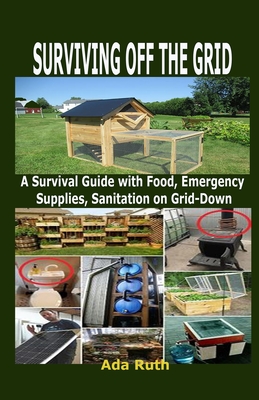Surviving Off the Grid: A Survival Guide with Food, Emergency Supplies, Sanitation on Grid-Down

Surviving Off the Grid: A Survival Guide with Food, Emergency Supplies, Sanitation on Grid-Down
If you're reading this, you're probably already relatively well-versed in the No-grid lifestyle, but, for those of you who are brand-new to the idea of going rogue, here's a bit of a rundown: Living No the land means to survive only by the resources-food, water, and power, primarily-that can be harvested from the natural land.
In other words, those who live off the land survive by hunting or foraging for their food and harvesting power from natural sources like the sun or wind. Whether you call it homesteading, No-grid living, or permanent camping, living No the land is a rewarding way to train yourself and your family to be fully self-sufficient.
The three most basic requirements of No-grid living
There are so many reasons to unplug and set up shop on your very own piece of land, but you absolutely should not go forward with this lifestyle if you don't have access to the three basic requirements of homesteading:
1. Water - On-grid dwellers don't have to worry about sourcing water. It's pumped straight to their homes through the public utility or a well. No-grid, you're on your own. You can bring water to your home site in various different ways, such as rainwater harvesting, digging a well, or using wind or solar power to supply H2O to your home via a freshwater source. When you go on No grid, you'll find very quickly that water is a precious resource. You won't get far without clean, reliable water, so save those containers and stock up!
2. Food - The pursuit of food (energy) is nearly everything in wilderness living. When you remove yourself from the typical way of life and opt to live off the land, you instantly turn from a regular citizen to a hunter-gatherer. Food sourcing means becoming skilled at hunting, fishing, gardening, farming, composting, land management (e.g., creating the ideal food plots to attract deer or other food sources to your property), and many other vital life-giving skills.
3. Shelter - Staying safe from the elements-cold, rain, wind, snow, and extreme heat-is one of the most important things you can do to stay productive, safe, and (quite frankly) alive when you're living No the land. Building shelter doesn't just mean having a reliable roof over your head. It also means having a stash of rugged cold-weather gear and failsafe fire-starters on hand. Security from intruders and wild animals is also a vital component of reliable shelter.
PRP: 77.42 Lei
Acesta este Pretul Recomandat de Producator. Pretul de vanzare al produsului este afisat mai jos.
69.68Lei
69.68Lei
77.42 LeiLivrare in 2-4 saptamani
Descrierea produsului
If you're reading this, you're probably already relatively well-versed in the No-grid lifestyle, but, for those of you who are brand-new to the idea of going rogue, here's a bit of a rundown: Living No the land means to survive only by the resources-food, water, and power, primarily-that can be harvested from the natural land.
In other words, those who live off the land survive by hunting or foraging for their food and harvesting power from natural sources like the sun or wind. Whether you call it homesteading, No-grid living, or permanent camping, living No the land is a rewarding way to train yourself and your family to be fully self-sufficient.
The three most basic requirements of No-grid living
There are so many reasons to unplug and set up shop on your very own piece of land, but you absolutely should not go forward with this lifestyle if you don't have access to the three basic requirements of homesteading:
1. Water - On-grid dwellers don't have to worry about sourcing water. It's pumped straight to their homes through the public utility or a well. No-grid, you're on your own. You can bring water to your home site in various different ways, such as rainwater harvesting, digging a well, or using wind or solar power to supply H2O to your home via a freshwater source. When you go on No grid, you'll find very quickly that water is a precious resource. You won't get far without clean, reliable water, so save those containers and stock up!
2. Food - The pursuit of food (energy) is nearly everything in wilderness living. When you remove yourself from the typical way of life and opt to live off the land, you instantly turn from a regular citizen to a hunter-gatherer. Food sourcing means becoming skilled at hunting, fishing, gardening, farming, composting, land management (e.g., creating the ideal food plots to attract deer or other food sources to your property), and many other vital life-giving skills.
3. Shelter - Staying safe from the elements-cold, rain, wind, snow, and extreme heat-is one of the most important things you can do to stay productive, safe, and (quite frankly) alive when you're living No the land. Building shelter doesn't just mean having a reliable roof over your head. It also means having a stash of rugged cold-weather gear and failsafe fire-starters on hand. Security from intruders and wild animals is also a vital component of reliable shelter.
Detaliile produsului








